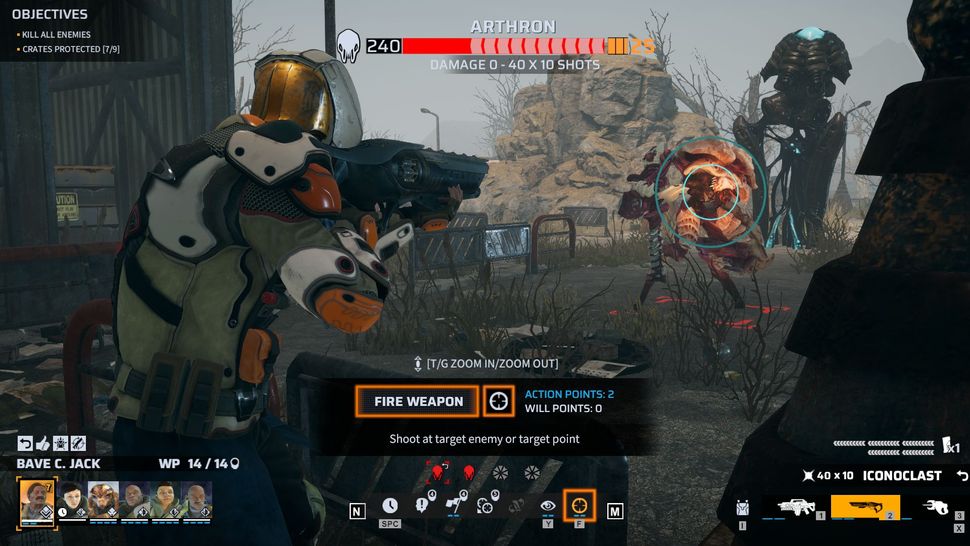There was "hostility" when Phoenix Point was announced as an Epic exclusive, but Julian Gollop doesn't have regrets.
Epic's strategy of timed exclusives helped make it an established source of videogame deals, but not without inspiring quite a bit of vitriol—some from folk with understandable grievances, but a lot of it from Steam stans. This vitriol often gets directed towards the developers who accept these deals, too, as it did when Phoenix Point studio Snapshot Games teamed up with the store. This has not, however, soured CEO and X-COM creator Julian Gollop on the strategy.
"When we did our Epic exclusive—this was the very early days of the Epic store promotion—yeah, there was a lot of hostility. And also a lot of conspiracy theories about it. The whole Chinese spyware and all the rest of it. Obviously, that's settled down a bit, and Epic has been great for many indies, in fact. It was another avenue to get funding, of course, which is very, very difficult to get with an indie studio. So overall, it was very positive for Phoenix Point itself. We had extra money that would go into making the game, which we didn't have otherwise. So it really did help the quality of the game itself, helped us get it released sooner rather than later and enabled us to put more content in so it was good."
Steam, of course, gives developers access to a vast audience, so waiting a year before releasing it on the platform still comes with some risks. "It's always better to have the widest access to storefronts as possible," Gollop acknowledges. "If you have the money to get to that finishing line, to get the game in a releasable state. But it's usually not that easy, and developers have to look for other ways to secure the funding they need."
Releasing a game on Steam doesn't mean you actually have access to all those users, either. Discoverability continues to be a big concern for everyone, in particular smaller or independent studios. Valve has attempted to alleviate this with things like the Discovery Queue and Steam Next Fest, but the amount of competition each game faces can sometimes seem insurmountable. With Epic exclusives, however, there's more of a push—a guarantee that Epic will try to put it in front of as many eyes as possible.
A staggered release also comes with some benefits. A second launch allows developers and publishers to drum up excitement all over again, and in the case of Phoenix Point it meant the new players got a better game. Over the year after its Epic launch, Snapshot Games introduced several updates, balance tweaks and other improvements.
"When we released the game initially, after the Kickstarter, we knew that we needed better tutorialisation," says Gollop. "It actually took us about a year—we did a lot of work on the game after the initial release in 2019. When it came to the Steam release in 2020, we had a much nicer, much better tutorial in place which gave a much better introduction to the story, and was well appreciated, I think, by a lot of new players."
There's an argument that developers have been using Epic launches as unofficial betas, polishing things up before the "main" launch on Steam, but it is the nature of modern game development to release post-launch fixes and updates. Few games, at least among those with teams still actively tinkering away, don't see some improvements a year after launch.
As well as the Epic deal, Snapshot Games used Kickstarter and Fig to fund Phoenix Point, which helped the studio go from 20 employees to 60 by 2020. Since then, it's been snatched up by Embracer, and it's now a division of Saber Interactive. With so much competition and a constant stream of acquisitions, I wondered if Gollop thought there was still room for studios to go it alone.
"For a more mid-size indie studio, I'd say it's probably quite difficult. Once you get to a certain size and there's a lot of money flowing out every month, long-term security becomes quite a difficult strategic question. And it's very difficult to do that, especially if you're self-publishing and relying on every next title to be a hit or at least profitable is very difficult. So it's not surprising to see companies selling to bigger entities. The advantage with Embracer, though, is it is largely a collection of still independently-run studios. It's not like a monolithic entity, like the traditional publishing model, where in the bad old days big publishers would buy up studios and try to assimilate them like some kind of Borg-like entity."
What Gollop and the team at Snapshot are working on at Embracer will need to remain a mystery for now, but they did recently release the Phoenix Point: Complete Edition, which includes Steam Workshop support, putting the future of the game in the hands of its players.






14 Comments
Thank you for nice information. Please visit our web:
ReplyDeleteRidwan MS
Ridwan MS
Thank you for nice information
ReplyDeletePlease visit our web:
Ahmad Fahrurozi
Ahmad Fahrurozi
Ahmad Fahrurozi
Thank you for nice information
ReplyDeletePlease visit our website
https://uhamka.ac.id/
Muhammad Al Aziiz
Thank you for nice information.
ReplyDeletePlease visit dimas
Thank you for nice information. Please visit our web:
ReplyDeletehttps://uhamka.ac.id/
https://uhamka.ac.id/
Muhammad Sobari
Muhammad Sobari
Thank you for nice information.
ReplyDeletePlease visit dimas
Thank you for nice information.
ReplyDeletePlease visit dimas
Thank you for nice information. Please visit our web:
ReplyDeletehttps://uhamka.ac.id/
https://uhamka.ac.id/
MuhammadSobari
MuhammadSobari
Thank you for nice information
ReplyDeletePlease visit our website
https://uhamka.ac.id/
Muhammad Al Aziiz
Thank you for nice information
ReplyDeletePlease visit our web:
Ahmad Fahrurozi
Ahmad Fahrurozi
Thank you for nice information
ReplyDeletePlease visit our web:
Ahmad Fahrurozi
Ahmad Fahrurozi
Thank you for nice information.
ReplyDeletePlease visit our web:
Ahmad Fahrurozi
Ahmad Fahrurozi
Thank you for nice information.
ReplyDeletePlease visit dimas
Russian escorts in manesar
ReplyDelete,